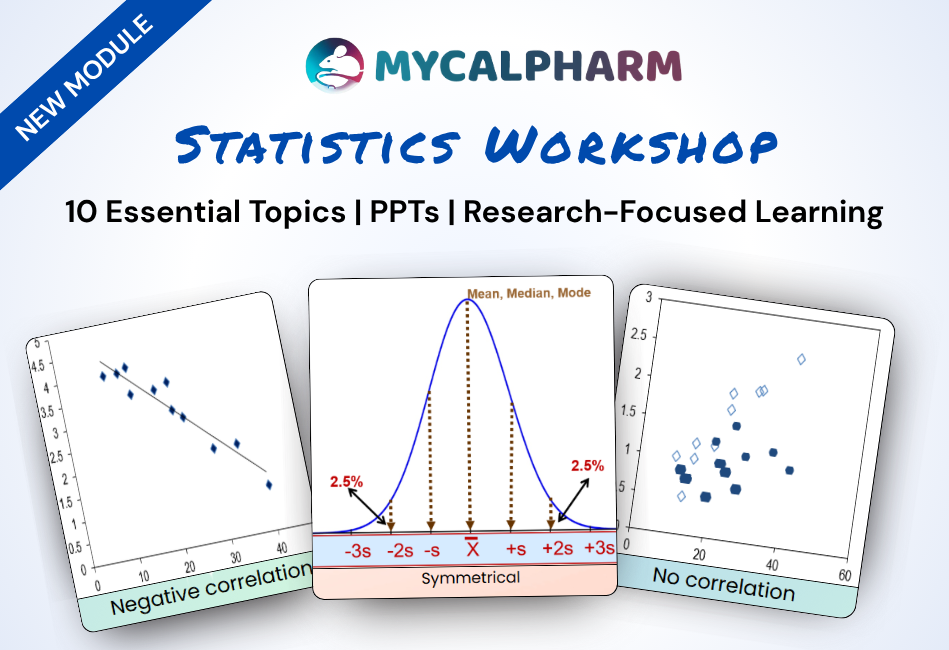
New Workshop on Basic Biostatistics Launched on MyCalPharm
We’re excited to announce the launch of a brand-new module on the MyCalPharm software. The Statistics Workshop! The purpose of this workshop is to help researchers, faculty, and students comprehend and use important statistical ideas that are crucial to biomedical and pharmacological research.
Whether you're assessing experimental data, preparing for exams, or assisting students with research methodology, this module offers ready-to-use, topic-wise PowerPoint presentations that make learning statistics simple and practical.
The Statistics Workshop: What's Inside?
There are ten main topics that make up the module; each addresses an important aspect of statistics used in biological experiments:
1. Data Features
Explore the different types of data: qualitative, quantitative, nominal, ordinal, continuous, and more. Understanding your data type is the first step to choosing the right analysis method.
2. Distribution of Data
Learn how data is distributed using visual tools like histograms and bell curves. Know the difference between normal and skewed distributions.
3. Summary Statistics
Master the use of averages (mean, median, mode), standard deviation, and range. These are basic tools to describe your data before moving to advanced analysis.
4. Inferential Statistics
Go beyond describing your data; inferential statistics help you make predictions and conclusions about a population from a sample.
5. Choosing a Test
One of the most important steps in data analysis is choosing the right statistical test. This topic helps you decide between parametric and non-parametric tests based on your data type and distribution.
6. Sample Size
Learn how to calculate the correct sample size to ensure your study is neither underpowered nor wasteful. Understand the importance of power analysis and confidence intervals.
7. t-Test and Wilcoxon Test
This module explains when and how to use the t-test for normally distributed data and the Wilcoxon test for non-normal data. Helpful comparisons and examples are provided.
8. ANOVA (Analysis of Variance)
Understand how to compare more than two groups using ANOVA. Both one-way and two-way ANOVA concepts are covered with examples.
9. Correlation and Regression
This subject focuses on using regression models and correlation coefficients to identify relationships between variables. Perfect for analyzing predictions and interpreting data.
10. Chi-Square Test
An important test for categorical data. Learn how to correctly interpret chi-square results and use contingency tables to test relationships between variables.
Who Should Use This?
Students preparing for assessments or projects that involve statistical interpretation.
Faculty searching for a ready-made set of teaching resources to support students through applied statistics.
Researchers are looking to increase the ability to analyze data so that experiments yield relevant results.
How to Access?
The Statistics Workshop is now available inside the MyCalPharm software under the “Workshops” section. Each topic comes with:
- A detailed PowerPoint presentation
- Key definitions and formulas
- Example-based explanations
- Quiz or recap (added in later versions of MyCalPharm)
- Frequently asked questions and answers
- In-built statistics calculator for sample data.
The content is presented in a consistent and easy-to-understand format for self-directed learning or in the classroom!
Why Is It Important?
In pharmacological experiments, it’s not just about performing a study; it’s about analyzing it correctly. Without the proper use of statistics, even the most accurate data can lead to incorrect conclusions.
This workshop ensures students and educators have access to clear, contextual, and relevant statistical training directly tied to experimental pharmacology.
What it is and what it is not?
The workshop is a training module for introductory biostatistics for beginners, and it includes a built-in statistical calculator for trying out sample hypothetical data. It is intended for training purposes only and should not be used for analyzing your research data. Use a commercial statistics package to analyze your research data.
Get Started Today
Log in to your MyCalPharm account and start exploring the Statistics Workshop. For access support or academic queries, you can reach out to your administrator or drop us a mail at info@mycalpharm.com.
Let’s make statistics simple, useful, and part of everyday learning.
